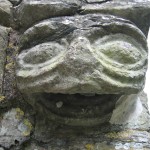 My research into the period between the Civil War (the spirituals) and the Civil Rights Movement (gospel music) continues to take some surprising turns. I mentioned African American pianist/producer/arranger Sammy Price a couple of posts ago. Turns out, there were a number of black artists who got their start here during this era.
My research into the period between the Civil War (the spirituals) and the Civil Rights Movement (gospel music) continues to take some surprising turns. I mentioned African American pianist/producer/arranger Sammy Price a couple of posts ago. Turns out, there were a number of black artists who got their start here during this era.
Also in Waco in the 1920s was Dick Campbell, a significant figure in the Harlem Renaissance. Campbell attended Paul Quinn College from 1922-1926, became and actor and performer with the likes of Ethel Waters, Bill “Bojangles” Robinson and Louis Armstrong before setting in Harlem, where he helped found the Negro People’s Theatre and co-found the famed Rose McClendon Players and Harlem Workshop Theater.
Waco was also fortunate to have a number of venues for live performances, most notably the Waco Auditorium. From most its history – from its inception in 1899 to its closing in 1928 – the Auditorium benefitted from the management and booking skills of the remarkable Gussie Oscar. Oscar had an eye for talent and capitalizing on the city’s location mid-way between Dallas and Austin, she saw to it that the most famous names of the day – Will Rogers, Harry Houdini, Jascha Heitfitz, Sarah Bernhardt and even the Four Marx Brothers performed in Waco amid the usual operas and symphony concerts.
Oscar was also very progressive when it came to race, in addition to the ever-present minstrel shows and so-called “colored revues,” she booked blues legend Mamie Smith and Her Jazz Hounds. She also brought Black Patti and Her Troubadores back on an annual basis. Black Patti was Sissieretta Jones, a gifted opera singer who could also sing vaudeville and show tunes and hers was one of the very few all-black legitimate shows to tour the Deep South.
So the Marx Brothers, Mamie Smith, AND Harry Houdini all visited Waco? As my son would say, “Whoa!”